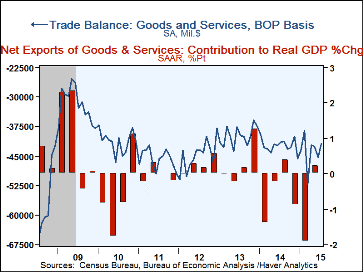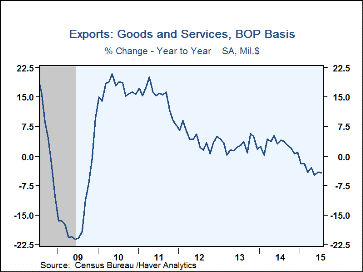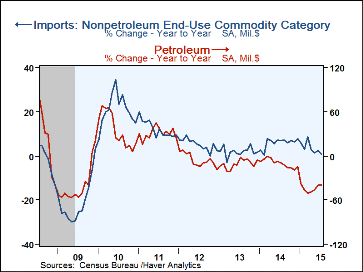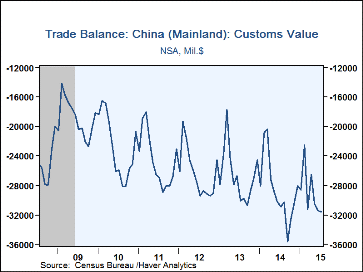 Global| Sep 03 2015
Global| Sep 03 2015U.S. Trade Deficit Is Shallower
by:Tom Moeller
|in:Economy in Brief
Summary
These foreign trade figures add to the preliminary numbers released last Friday by including trade in services and by country. The U.S. foreign trade deficit in goods and services during July eased to $41.9 billion from $45.2 billion [...]
These foreign trade figures add to the preliminary numbers released last Friday by including trade in services and by country.
The U.S. foreign trade deficit in goods and services during July eased to $41.9 billion from $45.2 billion in June, revised from $43.8 billion. A deficit of $42.0 billion had been expected in the Action Economics Forecast Survey. In constant dollars, the trade deficit in goods shrank to $56.2 billion from $59.0 billion in June. Real exports of goods improved 0.9% (-0.6% y/y) while real goods imports eased 0.9% (+4.2% y/y).
Overall, exports improved 0.4% in July (-4.2% y/y) after a 0.1% June dip. Goods exports increased 0.8% (-6.8% y/y) as auto exports jumped 4.7% (-9.7% y/y) following a 0.3% gain. Foods, feeds & beverage exports improved 1.7% (-8.4% y/y) after a 4.0% decline. Industrial supplies & materials exports gained 0.8% (-13.2% y/y) on the heels of a 1.8% decline and capital goods exports nosed 0.4% higher (-3.9% y/y) following two months of sharp decline. To the downside were nonauto consumer goods exports which posted a 2.5% decline (-0.4% y/y). That reversed half of the prior month's increase. Services exports improved 0.3% (3.1% y/y) as travel exports also gained 0.3% (4.2% y/y).
Imports fell 1.1% (-3.3% y/y) and reversed a 1.1% increase during June. Nonpetroleum goods imports declined 1.4% (+0.9% y/y). Foods, feeds & beverages imports fell 5.3% (-2.7% y/y) and reversed most of the June rise. Nonauto consumer goods imports were off 5.2% (+4.4% y/y), reversing the prior month's increase. Moving higher were automotive vehicles & parts imports by 1.1% (6.0% y/y) and that added to two months of strong increase. Industrial supplies & materials imports rose 0.9% (-25.3% y/y) after a 2.9% drop. Capital goods imports gained 0.5% (-0.5% y/y) following three months of sharp decline. Imports of services improved 0.5% (2.6% y/y) as travel imports increased 1.2% (7.9% y/y).
Petroleum imports increased 2.1% in July (-39.5% y/y) after a 9.3% increase. In constant dollars, petroleum imports rose 1.9% (4.6% y/y). The average per barrel cost of crude oil rose slightly to $54.20 (-44.6% y/y). The value of energy-related petroleum product imports increased 4.6% (-41.2% y/y) as their quantity rose 4.5% (2.0% y/y).
By country, the trade deficit in goods with China edged lower m/m to $31.6 billion, its deepest since October. Exports to China rose 2.3% y/y while imports from China also gained 2.3% y/y. The deficit with Japan deepened to $5.7 billion. Exports to Japan declined 2.9% y/y and imports from Japan fell 4.7% y/y. The trade deficit with the European Union deepened m/m to $15.2 billion. Exports to the EU declined 7.2% y/y while imports from the EU were little-changed y/y.
The international trade data can be found in Haver's USECON database. Detailed figures are available in the USINT database. The expectations figures are from the Action Economics Forecast Survey, which is carried in the AS1REPNA.
Bubbles and Fools from the Federal Reserve Bank of Chicago can be found here.
| Foreign Trade in Goods & Services (Current Dollars) | Jul | Jun | May | Y/Y | 2014 | 2013 | 2012 |
|---|---|---|---|---|---|---|---|
| U.S. Trade Deficit | $41.9 bil. | $45.2 bil. | $42.5 bil. | $41.4 bil. (7/14) |
$508.3 | $478.4 bil. | $536.8 bil. |
| Exports (% Chg) | 0.4 | -0.1 | -0.7 | -4.2 | 2.8 | 2.7 | 4.3 |
| Imports | -1.1 | 1.1 | -0.4 | -3.3 | 3.4 | 0.1 | 3.0 |
| Petroleum | 2.1 | 9.3 | -0.4 | -39.5 | -9.6 | -11.0 | -5.5 |
| Nonpetroleum | -1.4 | 0.5 | -0.7 | 0.9 | 6.1 | 2.0 | 5.2 |
Tom Moeller
AuthorMore in Author Profile »Prior to joining Haver Analytics in 2000, Mr. Moeller worked as the Economist at Chancellor Capital Management from 1985 to 1999. There, he developed comprehensive economic forecasts and interpreted economic data for equity and fixed income portfolio managers. Also at Chancellor, Mr. Moeller worked as an equity analyst and was responsible for researching and rating companies in the economically sensitive automobile and housing industries for investment in Chancellor’s equity portfolio. Prior to joining Chancellor, Mr. Moeller was an Economist at Citibank from 1979 to 1984. He also analyzed pricing behavior in the metals industry for the Council on Wage and Price Stability in Washington, D.C. In 1999, Mr. Moeller received the award for most accurate forecast from the Forecasters' Club of New York. From 1990 to 1992 he was President of the New York Association for Business Economists. Mr. Moeller earned an M.B.A. in Finance from Fordham University, where he graduated in 1987. He holds a Bachelor of Arts in Economics from George Washington University.
More Economy in Brief
 Global| Feb 05 2026
Global| Feb 05 2026Charts of the Week: Balanced Policy, Resilient Data and AI Narratives
by:Andrew Cates










